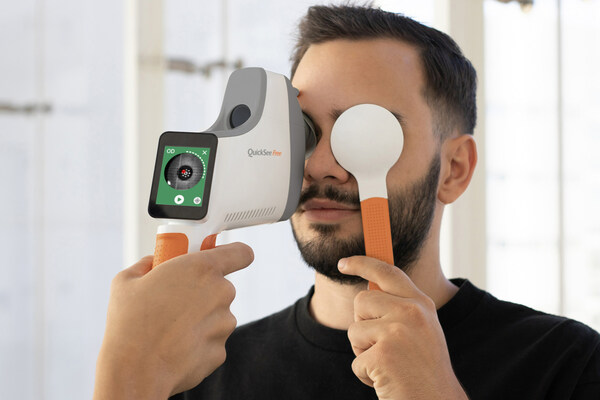The Universidad Autónoma de Madrid launches the First Edition of the UAM Innovation and Knowledge Transfer Awards to recognize the work of its Teaching and Research Staff who have contributed significantly to the development of activities of generation, dissemination and transfer of knowledge seeking to solve the essential problems of society. In this first edition, MEDIC has been awarded in the Experimental sciences, health and engineering category
Year: 2023
QuickSee Free, a new handheld wavefront aberrometry-powered autorefractor from PlenOptika, was named winner in the Material & Equipment category of the 30th SILMO D’Or awards in Paris on Saturday, September 30.
“This is a reward for a lot of innovation and work,” said Rodolphe Tessé, President of Saargos, PlenOptika’s distribution partner in France. “PlenOptika shares our values to bring better vision to people through technology.”

QuickSee Free is PlenOptika’s new medical device designed to make accurate objective refraction measurements—the critical for accurate eyeglass and contact lens prescriptions—more accessible. “We designed QuickSee Free to help you, the opticians, optometrists, and ophthalmologists, improve your care for your patients and customers in your stores, hospitals, and clinics,” said Shivang Dave, PlenOptika CEO, upon receiving the award. “But also so you can transform how you reach people who might be not able to reach you. We’re hoping this helps you continue to reach everyone in the world.”
The SILMO D’Or Prizes are given each year at the SILMO international optics and eyewear exhibition, which is attended by more than 34,000 people. The prize recognizes the excellence, creativity, and innovation of manufacturers and brands from all around the world. In addition to the equipment category, prizes are given for lenses, children’s eyewear, eyewear technology innovation, sunglasses brands and designers, eyewear frame brands and designers, and sport and protective eyewear.
“This is such an amazing event,” said Dave. “We’re honored to be a part of the innovation exhibited here.”
Uncorrected refractive error, which can be treated with inexpensive eyeglasses, affects about 33 million people in the United States, and 1.1 billion people globally. PlenOptika designs technologies that replace outmoded legacy technology and address the critical shortage of trained professionals to meet the exam demand. QuickSee Free’s accuracy and ease of use enable task-shifting to trained operators, expanding workforce capacity, enabling new care modes in private practice and large scale clinical enterprises as well as in community and global health initiatives.
The technology development for QuickSee Free was supported in part by a grant from the NASA-supported Translational Research Institute for Space Health (TRISH), which leads a national effort to translate cutting edge emerging terrestrial biomedical research and technology development into applied space flight human risk mitigation strategies for human exploration missions.
More info link
A new work called Ametropia Detection using a novel, compact, wavefront autorefractor has been published in the prestigious OPO Journal.
Key Points of this research are
- Refractive prescriptions obtained from an autorefractor can be an effective tool for extending eyecare coverage to a broader population base, especially in low- and middle-income countries and remote areas where there is shortage of optometrists and facilities to deliver refractive care services.
- Most studies assessing the accuracy of autorefractors have used subjective findings obtained by an experienced optometrist for comparison. While this methodology is commonly accepted, it fails to consider the inherent variability of the subjective refraction.
- This paper proposes an alternative approach for assessing the accuracy of an autorefractor by comparing the difference between the autorefractor and two subjective findings versus the difference between the two subjective results.
The paper is published in open Access and can be found here
El principal objetivo de esta jornada se centra en mostrar diferentes actividades y salidas profesionales relacionadas con la Expresión Gráfica y el Diseño Asistido por Ordenador (DAO) en las que podrían acabar participando los graduados en diferentes disciplinas técnicas como ingenierías o arquitectura. También se reflejarán las exigencias o expectativas de empresas y perspectivas laborales en un futuro a corto-medio plazo en este ámbito.







